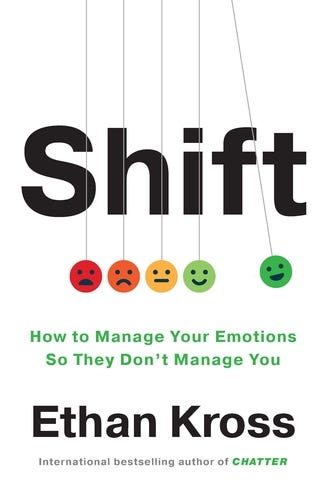Zielschmerz, apolytus, and the wends: How new emotion words can help you to deal with stress
The more precisely we can describe our feelings, the better we fare
Hi everyone,
Here’s your fresh dose of evidence-based advice and life hacks.
Since we’ve just entered a new month, here’s a little reminder of the Fresh Start Effect. It comes from the brain’s habit of organising our life story into chapters, and research suggests we can use it to restore flagging motivation. Over the past couple of weeks, I’ve fallen behind on my New Year’s fitness goals, for instance – but I’ve framed the start of February as a new beginning, and I already feel more energised.
This week I’d like to focus on emotions, however – and the benefits of embracing new words to describe our feelings.
Have you ever felt apolytus, for instance? That’s the moment you realise you are changing as a person, finally outgrowing your old problems like a reptile shedding its skin.
How about the wends? The frustration that you’re not enjoying an experience as much as you should.
Or Zielschmerz? This is the dread of finally pursuing a lifelong dream, which requires you to put your true abilities out there to be tested on the open savannah.
All three of these terms come from John Koenig’s Dictionary of Obscure Sorrows, a compilation of original terms to describe feelings that are unrecognised in the English language. In the author’s words, “its mission is to shine a light on the fundamental strangeness of being a human being – all the aches, demons, vibes, joys, and urges that are humming in the background of everyday life”.
I could get lost for hours in Koenig’s project, and according to a host of studies, it may be time well spent. Over the past couple of decades, psychologists have been increasingly interested in a concept known as “emotion differentiation” – which describes our capacity to label and describe subtle differences in our emotional states.
Imagine that you’ve recently moved to a new city. Someone who simply says they feel “stressed” without giving much detail probably has pretty poor emotion differentiation. Someone who can instead identify the differences between feeling anxious, lonely, homesick, and nostalgic has higher emotion differentiation.
People with greater emotion differentiation tend to fare better on a host of measures. They are less likely to experience depression, for instance, and less likely to turn to alcohol or binge eating to deal with the challenges they face. They don’t lash out when they feel they’ve been wronged.
One reason may be that naming an emotion makes it easier to solve the underlying problem and regulate the uncomfortable feelings. Once you recognise that you feel homesick, for instance, you may be more likely to call a friend or a family member for a catch-up. If you’re feeling anxious about your new job, on the other hand, you might benefit from doing a bit of prep for your first day, or – if there’s nothing practical to do – watching a film to take your mind off it.
The good news is that emotion differentiation can be learnt – and that this helps to reduce people’s distress in the face of life’s challenges. These interventions often concern fairly basic concepts – the definitions of fear, anger, disgust and the ways to tell them apart – but there are many ways we can refine our vocabulary.
Artistic projects like the Dictionary of Obscure Sorrows can get us to think about our feelings in new ways, as can novels and memoirs. We can also look to other languages. Dr Tim Lomas, for instance, has created the Positive Lexicography Project, which aims to capture and examine how emotions are encoded across cultures. Three of my favourite examples come from German:
Sehnsucht – Life longings, intense desire for alternative paths and states
Eilkrankheit – ‘Hurry sickness’; a behaviour pattern characterised by continual rushing and anxiousness
Torschlusspanik – ‘Gate-closing panic’; the worry/fear about diminishing life opportunities as one gets older; also refers generally to people acting hastily when time is running out.
It’s not hard to see how familiarity with these terms could change our behaviour. As I approach 40, recognising Torschlusspanik might lead me to reappraise the direction my life is heading and to pursue new ambitions – or encourage me to count my blessings for what I already have, rather than heading into a full-on mid-life crisis.
Personally, I find some comfort in the simple fact that many others have been through the same feelings before.
Book of the Week: Shift by Ethan Kross
If you’re interested in reading more about emotion differentiation, I’d thoroughly recommend Lisa Feldman Barrett’s How Emotions Are Made. As the name suggests, it’s a fascinating exploration of the neuroscience of emotions – and the ways that our words for our feelings can have a very real effect on the way we experience them.
This week’s Book of the Week, however, is Ethan Kross’s Shift: How to Manage Your Emotions so They Don’t Manage You, which will be published on Tuesday. Kross is a professor of psychology at the University of Michigan, and his last book, Chatter, is one of my favourites of all time. Shift describes a whole toolkit of emotional regulation strategies, and it’s full of incredible storytelling. I recently interviewed Kross for the BBC; the piece should be out shortly.
That’s all for this week! Thanks again for your support. Please do subscribe if you haven’t already, and share with anyone who might like to learn about our more obscure emotions.
David







Another German word which I find quite intriguing and evocative is “Fernweh” - I cannot find it in other languages I know…
You Brits actually have one of the most idiosyncratic words to name a very specific emotion: demob happy (unsure I'm spelling it right). I don't know if there's anything like it in German or (American) English.